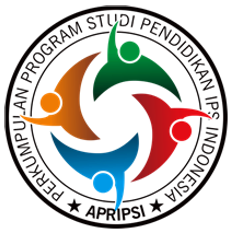PENGARUH METODE MENGAJAR GURU DAN FASILITAS BELAJAR TERHADAP HASIL BELAJAR IPS
Abstract
The role of the teacher is needed to determine the quality of learning. In addition to the teacher's teaching methods, learning facilities can also affect student learning outcomes. This study aims to determine 1) the effect of teacher teaching methods on social studies learning outcomes; 2) the effect of learning facilities on social studies learning outcomes; and 3) the effect of teachers' teaching methods and learning facilities on social studies learning outcomes. Sampling was taken as many as 78 of the 346 population in class VII MTs Negeri 1 Kediri. This study uses a quantitative approach with the type of ex post facto. Test data analysis using multiple regression analysis with a probability level of 5%. The results of the study show 1) the teacher's teaching method influences the social studies learning outcomes; 2) learning facilities have an effect on social studies learning outcomes; and 3) teachers' teaching methods and learning facilities have a simultaneous effect on social studies learning outcomes by 59.2% and the rest is influenced by internal factors within students.
Abstrak
Peran guru sangat diperlukan guna menentukan kualitas pembelajaran. Selain metode mengajar guru, fasilitas belajar juga dapat berpengaruh terhadap hasil belajar siswa. Penelitian ini bertujuan untuk mengetahui 1) pengaruh metode mengajar guru terhadap hasil belajar IPS; 2) pengaruh fasilitas belajar terhadap hasil belajar IPS; dan 3) pengaruh metode mengajar guru dan fasilitas belajar terhadap hasil belajar IPS. Pengambilan sampel diambil sebanyak 78 dari 346 jumlah populasi pada siswa kelas VII MTsN 1 Kediri. Penelitian ini menggunakan pendekatan kuantitatif dengan jenis ex post facto. Uji analisis datanya menggunakan analisis regresi berganda dengan taraf probabilitas sebesar 5%. Hasil penelitian menunjukkan 1) metode mengajar guru berpengaruh terhadap hasil belajar IPS; 2) fasilitas belajar berpengaruh terhadap hasil belajar IPS; dan 3) metode mengajar guru dan fasilitas belajar berpengaruh secara simultan terhadap hasil belajar IPS sebesar 59,2% dan selebihnya dipengaruhi oleh faktor internal dalam diri siswa.
Downloads
References
Amin, S. (2019). Pengaruh Group Investigation dan Gaya Belajar terhadap Hasil Belajar Geografi Mahasiswa Pendidikan IPS. Jurnal Pendidikan Ilmu Pengetahuan Sosial, 5(2).
Amirin, T. M. (2013). Manajemen Pendidikan. UNY Press.
Arikunto & Yuliana. (2009). Manajemen Pendidikan. Aditya Media.
Aziz, A. A., Yusof K. M, & Y. J. M. (2012). Evaluation on The Effectiveness of Learning Outcomes from Students Perspectives. Procedia-Social and Behavioral Sciences.
Barnawi & M. Arifin. (2012). Strategi dan Kebijakan Pembelajaran Pendidikan Karakter. Ar-Ruzz Media.
Danasasmita, W. (2009). Metodologi Pembelajaran Bahasa Jepang. Rizki Press.
Djaali. (2012). Psikologi Pendidikan. PT. Bumi Aksara.
Dopensius. (2015). Pengaruh Metode Mengajar Guru dan Kelengkapan Fasilitas Laboratorium Komputer terhadap Hasil Belajar Siswa Kelas X Kompetensi Keahlian Teknik Komputer dan Jaringan di SMK Nasional Berbah Sleman Yogyakarta. Skripsi.
Ekwunife-Orakwue, K. C., & Teng, T. L. (2014). The Impact of Transactional Distance Dialogic Interactions on Students in Online and Blended Environment. Computers & Education.
Farid, D. & M. (2013). Konsep dasar Manajemen Pendidikan di Sekolah. Gava Media.
Gie, T. L. (2002). Cara Belajar yang Efisien. Liberty.
Halimah, L. (2017). Keterampilan Mengajar sebagai Inspirasi untuk menjadi Guru Excellent di Abad 21. PT. Refika Aditama.
Hamalik, Oemar. (2007). Proses Belajar Mengajar. PT. Bumi Aksara.
Levin, B. B. (2001). Energizing Teacher Educationand Professional Development with Problem-Based Learning. Association for Supervision and Curriculum Development (ASCD). Alexandri: Virgina.
Nuriyah, N. (2014). Evaluasi Pembelajaran, Sebuah Kajian Teori. Jurnal Edueksos, 3(1).
Pham, H. (2011). Theory-Based Instructional Models Applied in Classroom Contexts. Literacy Information and Computer Education Journal (LICEJ), 2(2).
Riwayati, N. (2015). Pengaruh Fasilitas Belajar, Disiplin Belajar, dan Metode Mengajar Guru terhadap Hasil Belajar Siswa pada Mata Pelajaran Kearsipan Kelas X Jurusan Administrasi Perkantoran di SMK Negeri 1 Salatiga Tahun Ajaran 2014/2015 (Skripsi). Universitas Negeri Yogyakarta.
Shahril, M. I., Salimin, N. B., & Elumalai, G. A. (2015). The Validity and Reliability ofISO Test Towards The Performance Assessment of Future Physical EducationTeachers in Teaching and Learning Process. Social and Behavioral Sciences.
Slameto. (2013). Belajar dan Faktor-faktor yang Mempengaruhinya. Rineka Cipta.
Susanto, A. (2015). Teori Belajar dan Pembelajaran di Sekolah Dasar. Kencana.
Suyono & Hariyanto. (2019). Belajar dan Pembelajaran Teori dan Konsep Dasar (Cet. VIII). PT. Remaja Rosdakarya.
Warsito, B. (2018). Teori Belajar Robert M. Gagne dan Implikasinya pada Pentingnya Pusat Sumber Belajar. Jurnal Teknodik, 12(1).












